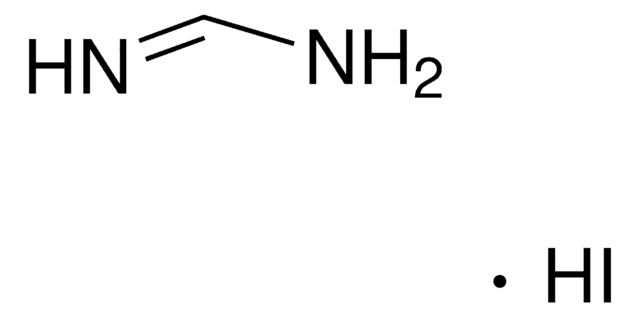806048
Formamidinium iodide
Sinónimos:
Greatcell Solar®, Iminomethylamine hydriodide, Methanimidamide iodide
About This Item
Productos recomendados
descripción
Elemental Analysis: C ~7.0%
Elemental Analysis: N ~16.3%
Nivel de calidad
Análisis
≥98% (H-NMR)
formulario
powder
características de los productos alternativos más sostenibles
Design for Energy Efficiency
Learn more about the Principles of Green Chemistry.
sustainability
Greener Alternative Product
mp
335 °C
categoría alternativa más sostenible
, Enabling
cadena SMILES
[NH2+]=C([H])N.[I-]
InChI
1S/CH4N2.HI/c2-1-3;/h1H,(H3,2,3);1H
Clave InChI
QHJPGANWSLEMTI-UHFFFAOYSA-N
Categorías relacionadas
Descripción general
Aplicación
Información legal
Greatcell Solar® is a registered trademark of Greatcell Solar Materials Pty Ltd
Palabra de señalización
Warning
Frases de peligro
Consejos de prudencia
Clasificaciones de peligro
Acute Tox. 4 Oral - Eye Irrit. 2 - Skin Irrit. 2 - STOT SE 3
Órganos de actuación
Respiratory system
Código de clase de almacenamiento
11 - Combustible Solids
Clase de riesgo para el agua (WGK)
WGK 3
Punto de inflamabilidad (°F)
Not applicable
Punto de inflamabilidad (°C)
Not applicable
Certificados de análisis (COA)
Busque Certificados de análisis (COA) introduciendo el número de lote del producto. Los números de lote se encuentran en la etiqueta del producto después de las palabras «Lot» o «Batch»
¿Ya tiene este producto?
Encuentre la documentación para los productos que ha comprado recientemente en la Biblioteca de documentos.
Los clientes también vieron
Artículos
To achieve net-zero emissions by 2050, renewable power contributions must triple. Photovoltaic stations provide vital utility power, achieved primarily through third- and fourth-generation technology. Promising trends include recycling and revolutionary, ultra-lightweight, flexible, and printable solar cells.
A brief tutorial on alternative energy materials for advanced batteries and fuel cells, as well as high-purity inorganics, conducting polymers, and electrolytes.
Next generation solar cells have the potential to achieve conversion efficiencies beyond the Shockley-Queisser (S-Q) limit while also significantly lowering production costs.
Dr. Perini and Professor Correa-Baena discuss the latest research and effort to obtain higher performance and stability of perovskite materials.
Nuestro equipo de científicos tiene experiencia en todas las áreas de investigación: Ciencias de la vida, Ciencia de los materiales, Síntesis química, Cromatografía, Analítica y muchas otras.
Póngase en contacto con el Servicio técnico













